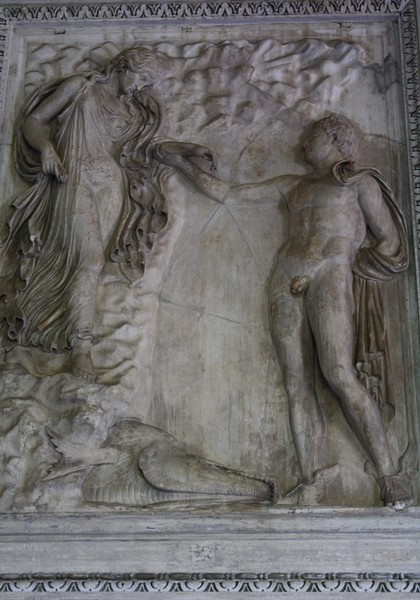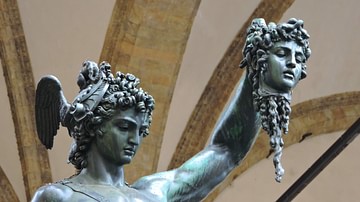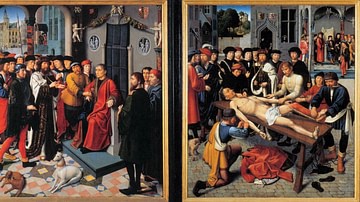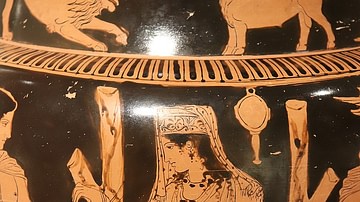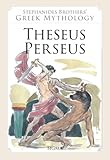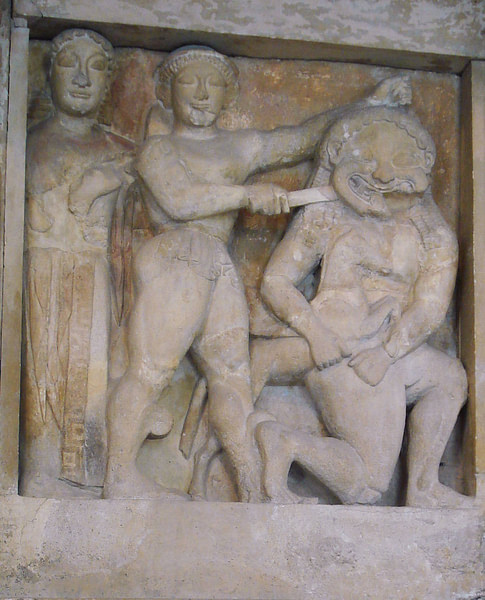
Perseus is one of the greatest and oldest pan-Hellenic heroes of Greek mythology. Perseus famously killed the dreaded Medusa, a Gorgon with snakes as hair and whose stare turned men to stone. Perseus also carried out the daring rescue of Princess Andromeda from a monstrous sea creature sent by the god Poseidon to terrorize the kingdom of Ethiopia.
The Son of Zeus
Perseus is perhaps the oldest of the Greek heroes with depictions of his beheading of the Gorgon Medusa being amongst the earliest scenes from mythology appearing in art. Even in mythology, he is believed to have lived three generations before that other great hero Hercules, who was himself one generation before the Trojan War. Perseus' mortal father was Danaos and his mother was Danae, the daughter of Akrisios (or Acrisius), the king of Argos. However, Perseus, as with other Greek heroes, was believed to have had divine parentage, something which helped to explain how they could achieve such fantastic feats of derring-do, providing a link between men and gods and fullfilling their function as role models. In Perseus' case, Zeus was thought to be his real father after the king of the gods himself had slept with Danae when she had been imprisoned by her father. Akrisios had locked up his daughter in an underground prison made of bronze after an oracle had declared that his future grandson would kill him. Of course, this was no barrier to Zeus who entered the cell as a shower of gold rain. Naturally, when the child was born, Akrisios was unwilling to believe Danae's far-fetched story of the golden rain. Suspicious and still mindful of the oracle, he sealed up the mother and child in a wooden chest and had them thrown into the sea. Zeus did not abandon his filial duties, though, and a quiet word with Poseidon ensured sufficiently calm seas, so that the chest washed up safely on the shores of the Aegean island of Seriphos and was found by Diktys, a fisherman who took them in and cared for the castaways.
Perseus & the Three Graiai
It was here on Seriphos that Perseus peacefully spent his formative years, impressing everyone with his physical prowess and courage. However, as he grew older Perseus became an obstacle to the designs King Polydectes (or Polydektes) had on Danae, and the king began to look for ways to rid himself of the youth. An opportunity arose when Perseus rashly boasted he could slay the dreaded Gorgon Medusa, whose stare could instantly turn men to stone. Polydektes immediately challenged Perseus to make good on his promise and if he failed, then the king would take possession of his mother Danae. The task seemed an impossible one, but here Perseus received guidance from the gods. Hermes and Athena counselled him to seek the advice of the three Graiai, who were known to be very wise and were actually sisters of the Gorgons. The three old witches shared one tooth and one eye between them and Perseus stole the eye, promising to return it only if the Graiai told him certain facts which would help him on his perilous mission. In some accounts the hero wanted to know the whereabouts of Medusa, in other versions he asks the Graiai where he could find the nymphs who had the cap of Hades, which made its wearer invisible, and winged sandals or boots so that he might fly. He also wanted a special bag (kibisis) in order to safely keep the severed head of Medusa, whose lethal stare still had power even after death. Naturally, the Graiai wanted their eye back, so Perseus got what he wanted and in addition, Hermes gave him a special adamantine sword or sickle (harpe) to do the deadly deed.
The Gorgon Medusa
Hesiod is our oldest surviving source of the story and he gives us a little background on Medusa. The three Gorgons were born from Gaia and Okeanos and of the three sisters - Sthenno, Euryale, and Medusa - only the latter was mortal. The Gorgons lived together in flowered meadows at the ends of the Earth, beyond the Ocean. The Gorgons were terrible creatures to behold with their claws, wings, and snakes as hair. Medusa's story is rather tragic as she, in fact, had once been very beautiful but had been transformed into a hideous Gorgon by Athena after the lovely maiden had been raped by Poseidon in one of the goddess' temples. In another version of the myth, Medusa had asked Athena if she might leave the far North where she lived and visit the South so that she might see the sun for the first time. However, Athena refused the request, and Medusa claimed the refusal was motivated by jealousy of her great beauty. Enraged by this boast, Athena promptly changed the beauty into an awful Gorgon whose stare turned anyone who looked into stone.
Using his flying sandals then, Perseus travelled to the ends of the earth (literally) and crept up on the Gorgons, glancing at them only through the reflection in his polished shield. Our light-footed hero, invisible thanks to his cap, beheaded Medusa without much fuss using his divine sickle or curved sword, the only unexpected event being the emergence of Chyrsaor and Pegasus, the winged horse, from the severed neck of the dead Gorgon. The two surviving Gorgons gave chase, but Perseus received aid from Athena and he easily escaped with his prize.
Returning to Seriphos, according to Apollodorus, Perseus' adventures continue. There is no other support for these additions in the Greek mythological tradition in literature, but there are 6th century BCE pottery depictions of certain scenes, and the additions have since become as much a part of the Perseus legend as the earlier adventures.
Perseus & Andromeda
To continue our story then, whilst travelling back home in triumph, the hero was arrested by the sight of the beautiful yet helpless princess Andromeda chained to a rock. Andromeda was the daughter of Kepheus (or Cepheus), the Ethiopian king, and Kassiopeia (or Cassiopeia). The god Poseidon had been angered by Kassiopeia's bold boast of her beauty, greater, she said, than even that of the Nereids, and so the Earth-shaker sent first a terrible flood and then a sea monster (ketos) to terrorize the kingdom. The only way to appease the god and forestall disaster was to sacrifice Andromeda to the coming monster. Falling in love with Andromeda at first sight, Perseus offered to deal with the monster if he could have the princess' hand in marriage. The desperate king agreed and by showing the head of Medusa with her still potent stare, Perseus ensured that the sea-monster was turned to stone. Collecting his prize, Phineus, brother of the king, blocked the union as Andromeda had been originally promised to him. Perseus swiftly dealt with this obstacle by showing the head to Phineus which turned him to stone, too.
Finally arriving back at Seriphos, Perseus learned that King Polydectes had been abusing his mother in his absence. The hero, therefore, presented to Polydektes the head of Medusa as promised but made sure the deadly stare caught the king's eye and turned him to stone. Perseus then presented the head as a gift to Athena who placed it at the centre of her fearsome aegis.
Other Adventures of Perseus
Perseus' later exploits included accidentally killing his grandfather with a quoit whilst competing in a sporting competition at Larisa in Thessaly. Akrisios had fled there precisely to avoid Perseus, but the fates would have their way, and a wayward throw went into the crowd and instantly killed the old man, thus fulfilling the oracle's prediction. Unable to bear ruling Argos and perhaps haunted by memories of his past, Perseus swapped his kingship for that of Tiryns from where he went on to found the nearby city of Mycenae. With Andromeda he had four sons: Elektryon, Alkaios, Perses, and Sthenelos and one daughter: Gorgophone. Elktryon would become the father of Alkmene, who himself would have a son: Hercules.
How is Perseus Shown in Greek Art?
In ancient Greek art, Perseus, wearing his hat, winged sandals, and the kibisis over his shoulder, first appears with Medusa on pottery in the late 7th century BCE. The head of Medusa (the gorgoneion) would become a common motif in Greek art and was possibly believed to avert the forces of evil. It appears on pottery, sculpture, shields, and monumental architecture, and one of the most celebrated representations of a Gorgon comes from the pediment of the Temple of Artemis on Corfu (c. 580 BCE). Here she displays the typical attributes of snakes as hair, large bulging eyes, a broad nose, and the tongue sticking out. A Corinthian amphora dated to c. 560 BCE shows (and names) Perseus attacking the ketos with Andromeda by the hero's side. In the mid-6th century BCE a Chalcidian amphora shows Perseus receiving his hat, sandals, and bag, various scenes appear of Perseus with Andromeda and in the 5th century BCE, Attic vases commonly depict Danae and Perseus in the wooden chest and scenes with Perseus and the Graiai. Perseus was also the subject of several tragedies in the 5th century BCE, notably those of Sophocles and Euripides.
